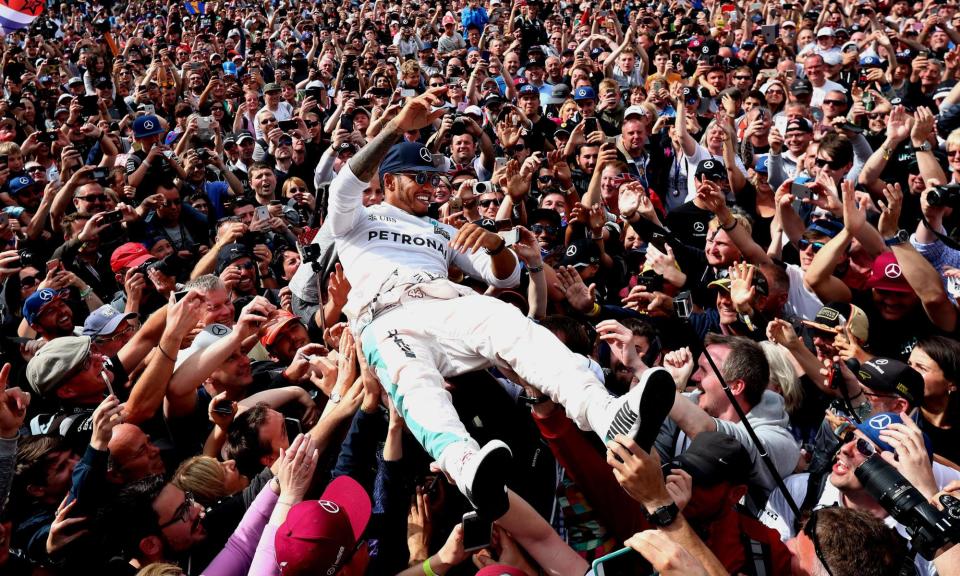How Mercedes were left stunned by Hamilton’s fast move to Ferrari

Lewis Hamilton and his close friend the Mercedes team principal, Toto Wolff, have long enjoyed a pre-season informal chat in the kitchen of Wolff’s Oxford home. Traditionally it has been a chance to connect face to face, to share their anticipation for the forthcoming season but on Wednesday it was the backdrop to Formula One’s most unexpected breakup.
In the past Wolff’s and Hamilton’s personal meeting over coffee has been so constructive it has been the occasion on which they have thrashed out the broad details of a new contract. This time a contract was on the agenda but it was not one Wolff had anticipated as Hamilton informed him of his intent to leave Mercedes for Ferrari in 2025. The most significant driver move for decades was as unforeseen for Wolff as it was to everyone in F1.
Related: ‘We’re big boys’: Wolff bears no grudge after Hamilton’s shock switch to Ferrari
On Friday, speaking publicly for the first time since the announcement, Wolff admitted he had heard some rumours in the days before but was still surprised when Hamilton informed of his decision, unsurprisingly given the rapidity with which the entire affair appears to have played out.
F1 is used to long, torturously protracted and often tedious contract negotiations, stretching out over months. Hamilton with typical panache appears to have pulled this off almost entirely in secret and with no little alacrity.
Reports that he had begun discussions with Ferrari in May of last year have been scotched both by the driver and sources close to him. Indeed Wolff said on Friday he believed that even in late December he felt the pair were going forward together as planned with the new two-year contract they had agreed in August.
“We were very aligned when we went into the Christmas period,” he said. “You need to ask Lewis why he changed his mind.”
That crucial detail will have to wait as Hamilton has yet to expand on the decision but what is clear is that it caught Wolff and Mercedes completely off guard. Not least because Ferrari, once involved, were willing to move very quickly and very generously to ensure they secured the seven-time champion, whom they have long wanted to persuade to come to Maranello.
The Guardian understands the negotiations were exceptionally, unusually swift, with one lawyer citing the contract as the quickest they had dealt with in F1. Ferrari were apparently “excited” from the moment the two sides began talks and unafraid to make a commitment. Hamilton’s current salary is estimated at around £40m.
That figure has been repeated for the new Mercedes deal but sources indicate the Ferrari package is well in excess of this number. All of which suggests that the process could have been concluded in the post-Christmas period.
The decision to leave the team that has been his home since 2013 and with whom he has scored six drivers’ championships, it seems was the most difficult part for Hamilton. It was a move both brave and bold, to take a chance on a new team, a new challenge with no guarantee of success but once taken it seems Hamilton’s commitment and the Scuderia’s eagerness made the process relatively undemanding.
“Once they started talking it was very easy,” one source told the Guardian, which seems almost low key and understated for something with such a seismic effect on the sport.
Wolff has also indicated he believes Hamilton wanted a longer-term contract than he had with Mercedes but this too has been disputed by insiders, who insisted it was not a factor in the decision.
Rather it appears that Hamilton knew he would be taking a risk but as he has emphasised, has a desire for a new challenge and clearly sees potential in Ferrari as he attempts to secure the eighth championship he craves. To do it in red would perhaps be the crowning glory.
Wolff suggested it was a gamble too. “Switching to Ferrari, maybe rolling the dice a bit, I can follow that decision,” he said. Which is doubtless true to an extent yet Hamilton was similarly bold in leaving McLaren for Mercedes in 2013, a decision questioned as a reckless gamble at the time.
Then he was a young man, consciously setting out on his own to leave the comfortable environment at McLaren he had enjoyed since he was 13. Now he is as experienced as they come, an old hand at playing the F1 game, acutely sensitive to the machinations involved and of the implications of his actions.
Yet despite the years between the two events and how he has grown as character over that time, Hamilton’s modus operandi and motivation appears remarkably similar. McLaren, as with Mercedes, had not expected his departure when he left them for a team he believed had potential and which presented an invigorating new challenge. What played out with Ferrari feels familiar, marked only now by the encroaching years adding an element of urgency to the affair.
What does seem clear is that the process, once Hamilton has made his mind up, is as decisive as any of the moves he makes on track. Little wonder then that Wolff and Mercedes were left stunned when the bombshell dropped over breakfast on Wednesday.

 Yahoo Sport
Yahoo Sport 



































































